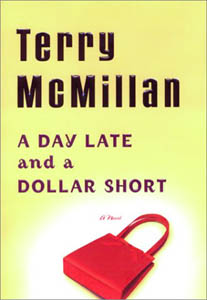![[Metroactive Books]](/books/gifs/books468.gif)
[ Books Index | San Jose | Metroactive Central | Archives ]

A Day Late and a Dollar Short By Terry McMillan Viking; 432 pages; $25.95 cloth Downscaling the Majestic In her new novel, Terry McMillan once again reduces a promising drama to pat conclusions and slack writing By Jesse Douglas Allen-Taylor A FRIEND OF MINE--a well-respected black literature professor from an Eastern college--was speculating on what you might call the "Terry McMillan phenomenon": the fact that while McMillan can be credited with almost single-handedly creating an African American urban women's market that now drives a significant portion of American publishing, the author's work itself doesn't get much respect from literary critics. The answer, my professor friend says, might be in a racial bias within the critics themselves. Perhaps they are "apply[ing] a Eurocentric framework that negates positive qualities of African American culture," she writes me in an email. "[Lately] there have been a few black women scholars advocating that McMillan's work be evaluated using a more Afrocentric [yardstick]. ... Others advocate reading some of her novels as loosely structured 'jazz' pieces worthy of serious literary criticism." I don't know. Jazz is not just the random playing of odd notes; it's a form best practiced by serious musicians who know the music rules and then go about breaking them to good effect. Same for serious novel writing. As for Afrocentrism--well, Africans tell stories with the best of them, and the telling of a good story is what matters most in evaluating any novelist. I can't speak for any other critics, but my problem with Terry McMillan is not her choice of stories, but simply the fact that she writes them at a mediocre level. Flat out, I think she can do better but doesn't see why she has to. Her latest, A Day Late and a Dollar Short, is a good example. THE NOVEL is flush with possibilities. It begins with Viola Price, a fiftysomething Las Vegas housewife hospitalized for a severe, life-threatening asthma attack. Her husband has recently left her to live in the projects with a welfare mother 20 years his junior, who he has just discovered has become pregnant again, probably with his child. In short order, we also learn that one of the Prices' three daughters has become addicted to prescription drugs while another is filing for divorce after she discovers that her husband has fathered a child by another woman. At the same time, the Prices' alcoholic, arthritic, unemployable son is being jailed for beating up his ex-wife's new husband. Meanwhile, we also learns that one 12-year-old granddaughter has been the victim of several years of molestation by her police officer stepfather, and while one teenage grandson confirms that he may have gotten two girls pregnant, a second grandson confirms the long-held suspicion that he is gay. Throw in a couple of IRS liens because of back taxes and unpaid child support, a DUI and a parking lot tire iron beating here and there, along with a ton of sibling jealousy and rivalry, and you've got all the ingredients for an epic novel on African American urban family angst. As always, McMillan finds ways to minimize what might be majestic. Her first problem is that, having come up with a number of creative problems for her characters, she does not take the time to work out creative, believable outcomes. A novel is about all that should be acceptable; McMillan writes in a cathedral-ful. One child hits the lottery, thus solving all of her financial problems. Another sells a cookbook--in advance--for six figures, enabling Viola to purchase a condo one step ahead of the tax collectors, along with a new car and some much-needed new teeth. The son's pending one-year sentence is unaccountably bumped down by a kindly judge to 90 days. The grandson's first impending fatherhood proves to be merely a false alarm; the second is aborted through being worked out, without drama, with his girlfriend's thoroughly understanding parents. When the molested grandchild refuses to testify against her stepfather, the mother discovers that she's known all along the address of one of her husband's previous spouses, and upon visiting she finds--how fortunately!--another molested stepdaughter who is perfectly willing to tell her tale to the police. It goes on like this for pages and pages. Sometimes, the characters' soliloquies border on the bizarre, as when one of the daughters sneaks into her son's room to see if he is really gay:
If McMillan sees anything odd about a mother ogling her son's nude male books while confirming that her son is gay--well, she doesn't reveal it. THE STRUCTURE of A Dollar Short would admittedly make it a difficult project for any writer, and McMillan gets props for striking out into new (for her) literary forms. The novel is told in rotating first person, with each adult family member taking several turns. Unfortunately, McMillan's inability to create sufficiently individual narrative voices for each character means that sometimes a page or more can go by before the reader can fathom exactly who is doing the narrative. This problem is exacerbated by the author's seemingly inherent need to write dialogue as if it were being transcribed verbatim from a tape recording. A judicious round of editing would have been in order, like, perhaps, simply arbitrarily cutting every third dialogue quote, for starters. These are all errors in craft, and certainly fixable by an established writer. One hopes Terry McMillan makes the effort her next time out. If she wants to be considered for serious literary criticism, she needs to take her work more seriously herself. [ San Jose | Metroactive Central | Archives ]
|
From the February 22-28, 2001 issue of Metro, Silicon Valley's Weekly Newspaper.
Copyright © 2001 Metro Publishing Inc. Metroactive is affiliated with the Boulevards Network.
For more information about the San Jose/Silicon Valley area, visit sanjose.com.